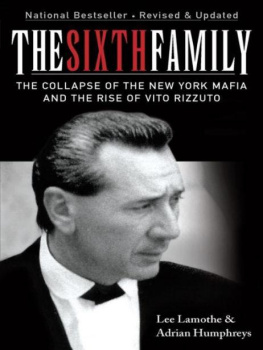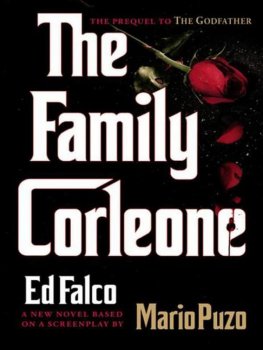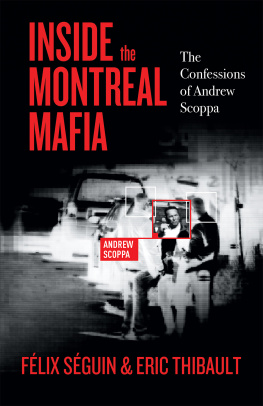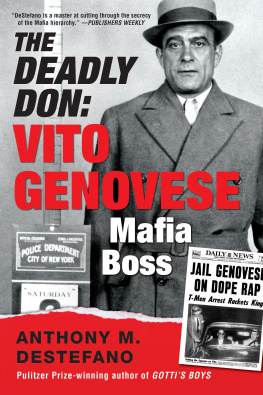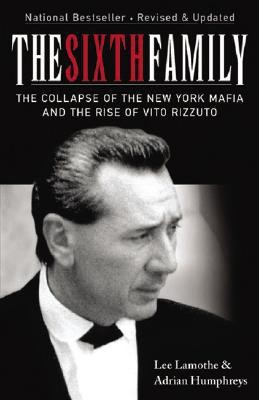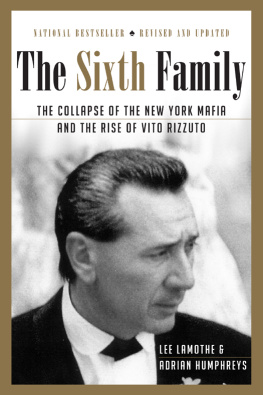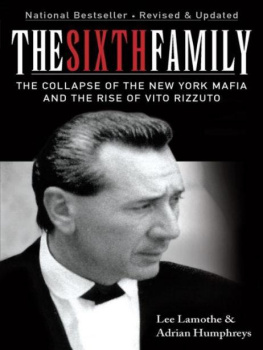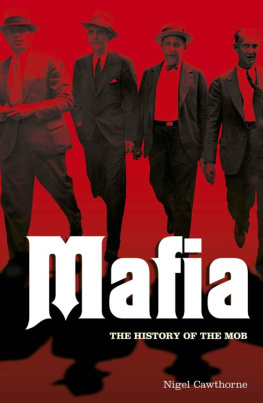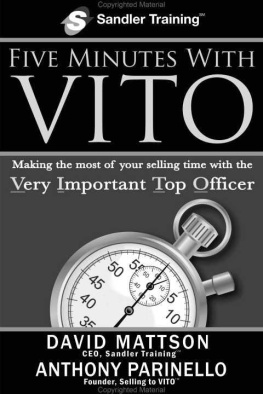Table of Contents
Copyright 2008 Lee Lamothe and Adrian Humphreys.
Care has been taken to trace ownership of copyright material contained in this text; however, the publisher will welcome any information that enables them to rectify any reference or credit for subsequent editions.
Library and Archives Canada Cataloguing in Publication Data
Lamothe, Lee, 1948-The sixth family : the collapse of the New York Mafia and the rise of Vito
Rizzuto / Lee Lamothe & Adrian Humphreys.Rev. ed.
Includes bibliographical references and index.
eISBN : 978-0-470-73832-0
1. Rizzuto, Vito. 2. Bonanno family. 3. MafiaUnited StatesBiography. 4. MafiaCanadaBiography. 5. Heroin industryUnited States. 6. Drug trafficUnited States. 7. MafiaNew York (State)New YorkHistory. 8. MafiaQubec (Province)MontralHistory.
I. Humphreys, Adrian, 1965- II. Title.
HV6452.N48L.1092 C2007-906344-6
Production Credits
Printer: Friesens
John Wiley & Sons Canada, Ltd.
6045 Freemont Blvd.
Mississauga, Ontario
L5R 4J3
FP
To the memory of my mother
Elsie Mae Lamothe (December 4, 1919 - March 20, 2006)
L.L.
To the memory of my grandfather
H.G. Humphreys (March 12, 1905 - June 19, 2001)
A.H.
Q: How many organized crime families are there in New York?
A: Five.
Q: What are the names of the five New York crime families?
A: Lucchese, Gambino, Colombo and the Genovese.
Q: And whats the fifth family?
A: Us, the Bonanno Family.
Testimony of Salvatore Good-Looking Sal Vitale, former
underboss of the Bonanno Mafia family, United States
Courthouse, Brooklyn, New York, June 28, 2004.
For the past 25 years, Montreal has been the key that turns the lock of America. The one holding that key becomes the pinnacle. The Rizzuto family was able to promise a transport between the Mafias of Europe and the Mafia of America. Riches were promised for all.
A leading anti-Mafia investigator with the Carabinieri , Italys
federal police force, 2006.
PROLOGUE
BROOKLYN, MAY 5, 1981
Dont anybody move. This is a holdup.
The words were clear despite the muffling effect of a woolen ski mask pulled down over the long, thin face of Vito Rizzuto, a 35-year-old Sicilian who called Canadas French-speaking city of Montreal his home. Vito was slumming it in New York City this day, more accustomed as he was to receiving nods of respect in Canada and Sicily as the son of a powerful mafioso, or relaxing on the coast of Venezuela, where his family controlled massive drug-trafficking interests. On May 5, 1981, Vito found himself bursting from a closet in a rundown Brooklyn social club, waving a pistol and shouting out stick-em-up clichs.
It was a casually dressed but powerful group of men who suddenly stopped their chatter and, startled by the sudden appearance of masked and armed men, looked up at Vito and three colleagues as they emerged from the narrow confines of the darkened closet. Gathered before them were the top men in the Bonanno Mafia Family, perhaps the most deadly and storied of New York Citys notorious Five Families, which between them control much of the continents underworld. The Bonanno captains, each a leader of crooks operating under the familys banner, had been summoned to an administrative meeting by Joseph Massino, a senior Bonanno captain often called Big Joey by his mob colleagues, a nod at first to his substantial girth and later to his position of power. Officially, peace was the sole item on the meetings agenda, talks meant to mend an unseemly rift between factions within the family that had grown from quiet disdain to open hostility and brought it to the brink of out-and-out warfare.
Among those in the social club, feeling particularly uncomfortable, were three leading captains who formed the core of opposition to Joseph Massino within the family: Alphonse Sonny Red Indelicato, Dominick Big Trinny Trinchera and Philip Philly Lucky Giaccone. Other gangsters milled about uneasily with them.
Earlier, before the guests started trickling into the private, two-story Brooklyn club, Vito Rizzuto had arrived to make dark preparations with Massino and Salvatore Vitale, a slender New York mobster known as Good-Looking Sal. At the time, Vitale was a mere mob associate, but he would go on to become the underboss, the second most powerful position in a Mafia family. Vito allegedly brought with him from Montreal two close mob friends of his own, Emanuele Ragusa, whose daughter would later marry Vitos son, and a veteran gangster identified by informants only as the old-timer, who was likely a Rizzuto relative with ties to the New York underworld.
The club was small and simply laid out; utility was chosen over decor for such private mob moments. Visitors passed through a narrow foyer into an unadorned room with a cloakroom to one side and stairs leading up to an area that was equipped to handle catering but in fact, primarily used to host a modest gambling racket by the clubs ownership group. This group included Salvatore Sammy Bull Gravano, who would soon become underboss of the Gambino Family under its notorious boss John Gotti and, later, a spectacular mob turncoat.
The minute I walked into the club, in the foyer, Vito, Emanuele and the old-timer, we were issued the weapons, told to have ski masks that wed put [on] in a closet in a coat room, said Vitale. Vito and Ragusa took pistols and were appointed lead shooters. Vitale was handed a heavy-duty machine gun, what he called a grease gun because it blasted automatic gunfire, and the old-timer suitably went old school, taking a sawed-off shotgun. Playing around with his new toy, Vitale accidentally squeezed the trigger, wildly spraying bullets around the club.
Dont shoot unless you have to, Massino scolded him. I dont want bullets flying all over the place. Even mobsters get the jitters.
We were in the closet, we all had our weapons loaded. We sat there and waited for the doorbell to ring, said Vitale. We left the door open a smidge to look out.
The ringing of the bell at the clubs entrance signaled the arrival of the first of the invited guests.
Vito crouched low, peeking out from his vantage point. Through the swelling crowd and loud chatter from tough men all accustomed to having their say, Vito kept his eyes on one man, Gerlando Sciascia, a fellow Sicilian who was a long-time Rizzuto family friend. Sciascia was easy to pick out because of his thick, silver hair, brushed back off his forehead in a bouffant hairdo that any aging Hollywood hunk would envy. Everyone in the room knew Sciascia; the Americans called him George from Canada because he was Montreals representative in New York, while the Canadians stuck simply with George.
Breathing deeply beneath his mask, Vito watched for the secret signal that would draw him from the closet, a signal that came when Sciascia slowly ran the fingers of his lean, right hand through the silver hair on the side of his head.
That simple act of preening brought mayhem to the social club and radically changed the balance of power. This was not about robbery, despite Vitos words when he confronted the gangsters. Nothing would be taken but three lives and the rights to an underworld throne.
Vito led the way, said Vitale, who was the last to scramble out of the closet. While Vito and Ragusa pointed their guns, Vitale and the old-timer jogged past them to block the clubs exit.


